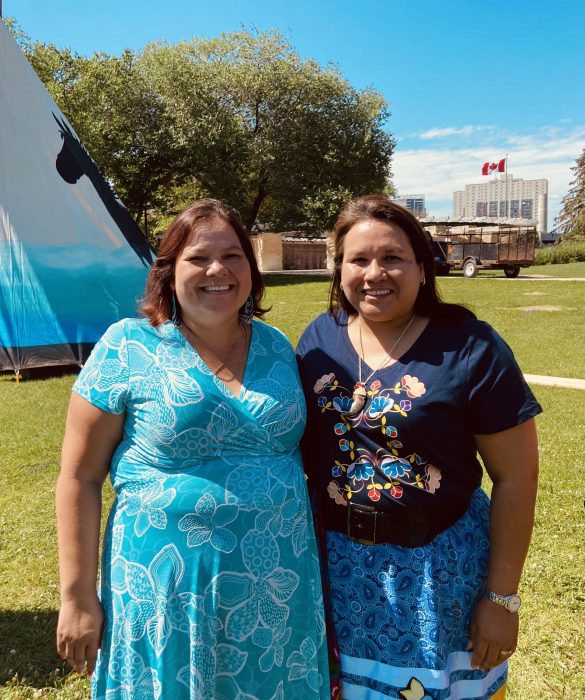
Kathleen BlueSky [MBA/15] (centre) joined by Jolene Mercer and Wiijii’idiwag Ikwewag board members and birth helpers.
Indigenous women empowering each other through traditional birth support
MBA alum and co-founder of Wiijii'idiwag Ikwewag facilitates healing for Indigenous families
“These are hard truths. They are the truth of what First Nations people endure and what I have to endure as a First Nations woman.”
Kathleen BlueSky’s [MBA/15] role as co-founder and board chair of Wiijii’idiwag Ikwewag began during her time in the Asper MBA program, in a confluence of hard truths and tenderness.
“I think had I not been in the MBA program, Wiijii’idiwag Ikwewag wouldn’t have rolled out the way that it did. We probably would have pursued government funding, limiting the scope of our mandate. But since we did it so independently, we had economic freedom to take this idea and bring it to people that were invested in our vision.”
While the idea for Wiijii’idiwag Ikwewag came before BlueSky’s time in the program, the MBA provided her with an opportunity to grow as a leader, to develop her vision and cultivate boldness in how she pursued it.
Wiijii’idiwag Ikwewag (which means Women Helping Each Other) provides birthing support that promotes traditional Indigenous childbirth and parenting teachings. Observing her mother, BlueSky learned these traditions. When she became a mother herself, she realized just how much she had learned.
“It was then that I came to understand the teachings, and as unprepared as I was, I was very prepared. I held this traditional knowledge in my body, mind and spirit” she says.
She acknowledges how this “heart work” project arose in reflections of her mother and from more difficult realities.
“My colleague Jolene Mercer and I had a dream of empowering women. At the time, I was working in health policy and intergovernmental relations while I was doing my MBA, and I was immersed in all this negativity all the time,” she says. “We had done a huge engagement project with communities that was called Bringing Our Children Home.

Jolene Mercer (L) and Kathleen BlueSky (R), co-founders of Wiijii’idiwag Ikwewag.
“We were talking to actual people who had grown up in child welfare, and they shared the tragic stories of what they had to experience. The biggest question they had was, ‘why was I taken from my family to be put in this terrible situation?’
“People have talked about child welfare reform, but we’re in the same place we were 100 years ago, when residential schools were operating: children are being removed from their homes or their communities and losing their language, their culture. That is still happening today, and, worse, they are being taken from the day they are born.”
BlueSky and Mercer consulted with knowledge keepers, keenly attuned to the tension of working in a system that they didn’t control. They were inspired to do more than change it.
“With Wiijii’idiwag Ikwewag, we decided to build something outside of the system.”
They agreed that to maintain their agency and vision, they would not take any government funding for their project that would require them to veer away from the spirit and intent of the birth work.
Garnering support from the Winnipeg Boldness Project and later securing a social impact bond, BlueSky and Mercer raised $2.7 million from private investors to get started. UM economics professor, the late Dr. John Loxley joined as Project Board Chair soon after.
For BlueSky and Wiijii’idiwag Ikwewag, birth is the most profound expression of creation. “We train birth helpers, and these birth helpers emotionally and spiritually support First Nations women who are pregnant. We help them to gain more independence. We support them to heal themselves, to empower themselves, to set goals to find stable housing, to leave abusive relationships—to confront the barriers they may face. All of this, so that they may be fully empowered in their rightful place as mothers.”
Wiijii’idiwag Ikwewag has demonstrated considerable success through their birthing and family support model with the prevention of over 75% of apprehensions in the first year. A formal evaluation of the whole program will be released in the coming months.
“From an economic perspective, that’s millions of dollars for the province over 18 years that children would otherwise be in care. Those resources could and should be re-profiled into prevention work. That’s where the real impact will be.”
In reflecting on completing her MBA and starting Wiijii’idiwag Ikwewag, BlueSky recalls her mother’s guidance, advice and care as she pursued these ambitious goals.
“She told me that I only needed to be brave one time. She’d say ‘You have to step up and say something one time. Once you have the courage to step out of your comfort zone, you never go back—that’s what growth is.’”
Her mother’s advice held in the MBA program, where, despite her ample professional experience, BlueSky felt at times that her leadership style, based more in active listening, was not a good fit among her seemingly confident, self-assured peers.
“Confidence is not about who speaks the most or the loudest,” she says. “Confidence is the willingness to try something you’ve never done, or in the case with Wiijii’idiwag Ikwewag, something no one has done before.”
Today, Kathleen BlueSky is making a difference not by creating new traditions but by empowering and reclaiming those that have always been with her—in her memories of her mother’s maternal gifts, in intergenerational stories of birth and in her own standing as a leader, a First Nations woman and a mother.






